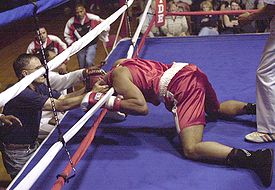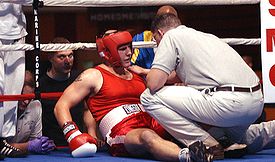- Knockout
-
"KO" and "K.O." redirect here. For other uses, see Ko (disambiguation). For other uses of "knockout", see Knockout (disambiguation).
A knockout (also referred to as a K.O.) is a fight-ending, winning criterion in several full-contact combat sports, such as boxing, kickboxing, Muay Thai, mixed martial arts, Karate and others sports involving striking. A full knockout is considered any legal strike or combination thereof that renders an opponent unable to continue fighting.
The term is often associated with a sudden traumatic loss of consciousness caused by a physical blow. Single powerful blows to the head (particularly the jawline and temple) can produce a cerebral concussion and cause a sudden, dramatic KO. Body blows, particularly the liver punch, can cause progressive, debilitating pain that can also result in a KO.
In boxing, kickboxing, etc. a knockout is usually awarded when one participant falls to the canvas and is unable to rise to his feet within a specified period of time, typically because of exhaustion, pain, disorientation, or unconsciousness. For example, if a boxer is knocked down and is unable to continue the fight within a ten second count, he is counted as having been knocked out and his opponent is awarded the KO victory.
In mixed martial arts competitions, no time count is given after a knockdown, as the sport allows submission grappling as well as ground and pound. If a fighter loses consciousness ("goes limp") as a result of legal strikes, or does not immediately defend himself after a knockdown, he is declared knocked out. As many MMA fights can take place on the mat rather than standing, it is possible to score a KO via ground and pound, a common victory for grapplers.
Contents
Technical Knockout
A technical knockout (also referred to as a T.K.O.) is declared when the referee, official ring physician, the fighter, or the fighter's cornermen decide that a fighter cannot safely continue the match.
In boxing, this can happen even if the fighter fails the 10 count; or, in many regions, a fighter has been knocked down three times in one round.[1] British records refer to TKOs as either "retired", if the fighter refuses to continue, or "R.S.F.", for Referee Stopped Fight. In amateur boxing, a knockout is scored as "RSC," for Referee Stopped Contest. A technical knockout ("Outclassed") can also be declared if a fighter is ahead by 15 points in a bout.
Types of T.K.O.'s
- Doctor's Stoppage/Injury: The fighter has suffered an injury and cannot continue the match safely.
- Corner Stoppage: The fighter is being completely battered, to the point where it is becoming dangerous. In some cases, the fighter may have suffered an injury. His corner decides to surrender on his behalf to prevent unnecessary damage or potential injury. (This is also known as "throwing in the towel").
- Stoppage Because of Strikes: The fighter is overwhelmed by strikes, and cannot intelligently defend himself. The referee intervenes to avoid unnecessary damage or potential injury.
- Multiple Knockdowns: The fighter is knocked down a certain number of times during a single round (common rule in most boxing and kickboxing contests).
Physical characteristics
There is little known about what exactly causes one to be knocked unconscious but many agree it has to do with minor trauma to the brain stem. This usually happens when the head rotates sharply, often caused by a strike. There are three general manifestations of such trauma - the typical knock out which results in a sustained loss of consciousness (comparable to general anesthesia - where the recipient emerges and has lost memory of the event), a "flash" knock out where a very transient (less than three seconds) loss of consciousness occurs (where the recipient often maintains awareness and memory of the combat), and lastly a "stunning" where consciousness is maintained despite extremely distorted proprioception, visual fields, and auditory processing. A basic principle of boxing, and other combat sports is to defend against this vulnerability by keeping both hands raised about the face and the chin tucked in.
A fighter who suffers a concussion and becomes unconscious from a strike with sufficient knockout power is referred to as having been knocked out or kayoed (KO'd). Losing balance without losing consciousness is referred to as being knocked down ("down but not out"). Repeated blows to the head are known to gradually cause permanent brain damage. In severe cases may cause strokes or paralysis.[citation needed] This is commonly known as becoming "punch drunk" or "Shot". Because of this, many physicians advise against sports involving knockouts.[2]
Fighters who lose by knockout (either by ten count or technical) are automatically suspended 30 days, three months if it is the second knockout within three months, or one year if it is the third knockout within one year.[citation needed] In AIBA competition, this does not apply if a fighter loses by a technical knockout outclassed, when a fighter is behind more than 20 points—15 for junior levels—in any round except the final round.[citation needed]
Knockdown
A knockdown occurs when a fighter touches the floor of the ring with any part of his or her body other than his or her feet following a hit. The term is also used if the fighter is hanging on to the ropes, caught between the ropes, or is hanging over the ropes and is unable to fall to the floor and cannot protect him or her self. A knockdown triggers a count by the referee; if the fighter fails the count, then the fight is ended as a K.O.[3]
A flash knockdown is a knockdown where the fighter hits the canvas but recovers quickly enough that a count is not started.[3]
See also
- Knockout power
References
- ^ Sugar, Bert. Boxing. www.owingsmillsboxingclub.com. URL last accessed March 4, 2006.
- ^ Lieberman, Abraham. Causing Parkinson: Boxing, Brain Injury. http://web.archive.org/web/20060422215508/www.liebermanparkinsonclinic.com/. URL last accessed June 24, 2010.
- ^ a b Boxing Terminology Ringside by Gus. URL last accessed June 17, 2008.
External links
- KO statistics of Mike Tyson, Wladimir Klitschko, Earnie Shavers, George Foreman and other heavyweight boxers
- The differences between knockouts and concussions; a simple discussion for beginning boxers
Decisions in combat sports Knockouts Knockout and technical knockoutJudges' scorecards Other Draw · Disqualification · No contest · Referee technical decision · Submission · Technical decision · Technical draw · Points decisionCategories:- Martial arts terms
- Boxing rules and regulations
Wikimedia Foundation. 2010.


